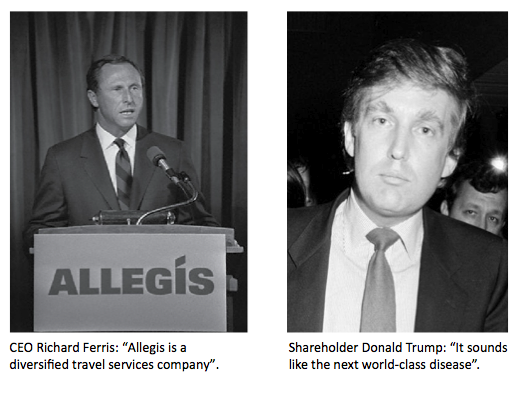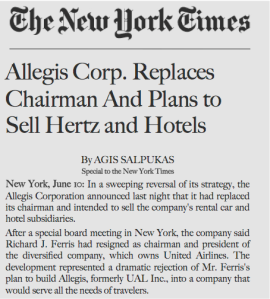What is a good name?
Most people would agree that the 1996 Lucent spin-off from AT&T was a brilliant success. The name ‘Lucent’ is cited as a triumph, as shiningly transformative as the literal meaning of the word on which it is based (lucent:from Latin lūcēns, present participle of lūcēre to shine).

And yet, according to one authoritative account, the whole naming process was a debilitating, angst-ridden affair. Lucent was unloved and unwanted. Right to the end AT&T executives were ready to ditch it. Consider this passage from Optical Illusions: Lucent And The Crash Of Telecom:
“No one loved the name Lucent…The choice of both name and symbol were controversial until the last, and Landor continued to developed the AGB name [Alexander Graham Bell’s initials] and an alternative, Telascent or Telescent.
As the process dragged on, Rich McGinn and Henry Schacht [President and CEO elect respectively] chatted in front of an elevator one evening. They had reconciled themselves to the fact that the Bell name [American Bell] would not be available, that no new name would emerge to sweep them off their feet, and as their elevator car descended to the ground the two agreed that Lucent was the best option available.
Yet neither was overly enthusiastic about the name, and as they ascended the stage to announce it to their employees, McGinn turned to Schacht and said, “Come on, Henry. One last chance, we can still change it if we want to”.”
Their worst fears were realized on launch day when newspapers ran their usual ‘What’s in a name’ story with quotes such as this:
“It’s a horrible name,” said Danny Briere, president of TeleChoice, a telecommunications consulting firm. “The good news is that it doesn’t sound like anything else; the bad is there’s a reason for it.”
For engineers steeped in a century of the Bell culture and telecom jargon Lucent was outside of their frame of reference. It was a gift thrust upon a recalcitrant management by force of circumstance: a spin-off needs a unique, ownable name in order to be spun-off, and all other options that were within their comfort zone were not available.
Kathy Fitzgerald, Lucent’s VP of Corporate Communications, was revealingly philosophical on this point:
“It turns out you don’t need to love the name or the logo to be able to turn it into one of the best known names in communications in less than two years. Because, trust me, I was at best lukewarm about the name – with its key virtue being that it wasn’t a made-up name and was actually a word in the meaning ‘marked with clarity and glowing with light’.”
The definition was repeated like a mantra to ward off evil spirits. How many people knew Lucent was a real word? Why does it matter? And how is ‘marked with clarity and glowing with light’ relevant?
Underlying this comment is an atavistic fear of what many executives think of as ‘made-up’ corporate names and a bias towards the tried-and-true of the familiar.
In spite of its eventual business decline and merger with Alcatel of France, Lucent’s initial success gave rise to a tranche of sound-alike imitators, circa 2000 – Agilent, Navigant, Thrivent, Mirant – all of them made-up names for companies hoping to borrow some of Lucent’s magic. Such is the corporate world psychology of naming.
So what transformed Lucent from the unpopular choice it was into a celebrated case of rebranding brilliance?
In a word: success.
The Lucent Technologies IPO was a huge success, thanks in no small measure to a $100 million ad campaign designed to underwrite the stock issue. Ipso facto, the name is a success.
At the other end of this spectrum there is the example of Consignia, which one newspaper was moved to call “one of the most disastrous corporate rebrandings ever undertaken”.
Consignia was launched in 2001 as the new name for the UK’s Post Office Group, a cumbersome collection of inefficient delivery services which included that most royal and ancient of institutions, the Royal Mail.
The rigorous restructuring plan was years in development. It was designed to bring the government-owned enterprise into the 21st century as a modern, competitively viable and internationally focused business. However, they didn’t reckon with public sentiment and the media’s penchant for indulging it.
If you can include the three words ‘royal’, ‘institution’ and ‘branding’ in the same sentence you have a potent complexity of popular interest that is red meat to the rabid British press.
After a remorseless torrent of negative news stories, union strike threats over job cuts and mounting financial losses the restructuring strategy was abandoned. In a final act of high symbolism, the whole sorry mess was renamed yet again, this time as the Royal Mail Group. Political expediency won the day. Consignia was sacrificed as proof of the plan’s demise.

Was Consignia a bad name? No. There are other names out there of similar ilk doing serviceable duty – Altria, Aviva, Centrica, etc. Consignia was pilloried in part because it did not do a very good job of explaining itself. In the end the strategy failed and, therefore, the name is associated to this day with a failure.
It was a lesson learned well by Aviva a few years later. When the British insurer Norwich Union decided to unify its global operations under a single name, Aviva, they took no chances. Ringo Starr, Bruce Willis and Alice Cooper were featured in a series of high-profile TV ads to make the point that changing your name is really OK; we did it – and just look at how successful we are.
It was rebranding 101 to the letter. The name and the campaign may have been pretty banal stuff but it worked. Aviva got its version of the story out first and stuck to it.
Is Aviva a better name than Consignia? Is Consignia worse than Lucent? It doesn’t matter.
In business, as in war, the victors get to write history. Ultimately, all rebranding is about PR and the battle for control of the story.
Related articles
- A seasonal recipe for Consignia – a naming stew (namedropping.wordpress.com)
- Alcatel-Lucent Chops Away at Years of Failure (businessweek.com)






